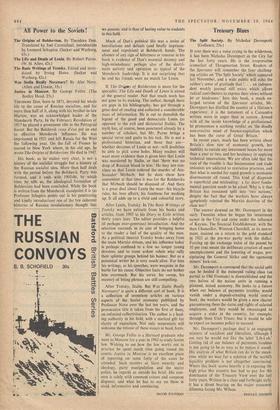All Power to the Soviets!
The Life and Death of Lenin. By Robert Payne. (W. H. Allen, 42s.)
Justice in Moscow. By George Feifer. (The Bodley Head, 25s.)
THEODORE DAN, born in 1871, devoted his whole life to the cause of Russian socialism, and for more than half of it, along with his brother-in-law Martov, was an acknowledged leader of the Menshevik Party. In the February Revolution of 1917 he played a prominent role in the Petrograd Soviet. But the Bolshevik coup d'etat put an end to effective Menshevik influence. He was imprisoned in 1921 and left Russia for the West the following year. On the fall of France he moved to New York where, in his old age, he wrote The Origins of Bolshevism. He died in 1947.
His book, as he makes very clear, is not a history of the socialist struggle but a history of the Russian socialist idea. More than half deals with the period before the Bolshevik Party was formed, and it ends with 1905-06, by which time, he tells us, the ideological formation of Bolshevism had been concluded. While the book is written from the Menshevik standpoint it is (as Professor Schapiro points out in his penetrating and kindly introduction) one of the few coherent histories of Russian revolutionary thought that we possess, and is thus of lasting value to students in this field.
Much of Dan's political life was a series of humiliations and defeats (and finally imprison- ment and expulsion) at Bolshevik hands. The absence of any sign of bitterness or rancour in his book is evidence of Dan's essential decency and high-mindedness; perhaps also of the doctri- naire naivety and optimism so typical of the Menshevik leadership. It is not surprising that he and his friends were no match for Lenin.
If The Orieists of Bolshevism is more for the specialist, The Life and Death of Lenin is aimed at the general reader. Not that much work has not gone to its making. The author, though there are gaps in his bibliography, has got through a great deal of reading and collected a considerable mass of information. He is out to demolish the legend of the good and democratic Lenin (as opposed to the evil and dictatorial Stalin). The myth has, of course, been punctured already by a number of scholars, but Mr. Payne brings a special verve and gusto to his task. He is not a professional historian, and those that are— whether devotees of Lenin or not—will doubtless be able to pick some holes. Many readers will want more evidence than is given here that Lenin Was murdered by Stalin, or that 'there was no drop of Russian blood in him.' He may not con- vince us that Lenin ordered the murder of Am- bassador Mirbach; but he does show how convenient at that time it was for the Bolsheviks that Mirbach should be disposed of. And there is a great deal about Lenin the man—his bicycle rides, his love affairs, his fondness for washing up. It all adds up to a vivid and colourful story.
After Lenin, Trotsky. In The Basic Writings of Trotsky we have extracts from his books and articles, from 1905 to his Diary in Exile written thirty years later. The editor provides a helpful (if perhaps over-generous) introduction. And the selection succeeds in its aim of bringing home to the reader a feel of the quality of the man. As a political theorist Trotsky broke away from the main Marxist stream, and his influence today is perhaps confined, to a few no longer young devotees and to some ardent rebels who rally their splinter groups behind his banner. But as a polemical writer he is very much alive. For him his writings, as his speeches, were weapons in the battle for his cause. Objective facts do not bother him overmuch. But his verve, his sweep, his masters' of biting phrases are still compelling.
After Trotsky, Stalin. But Was Stalin Really Necessary? is quite a different sort of book. It is a collection of seventeen articles on various aspects of the Soviet economy published by Professor Nove over the last ten years, and the provocative title is taken from the first of them, on enforced collectivisation. The author is a lead- ing authority in his field, with a marked gift for clarity of exposition. Not only economists will welcome the reissue of these essays in book form.
Mr. George Feifer is a Harvard graduate who went to Moscow for a year in 1962 to study Soviet law. Wishing to see how the law works out in practice he spent much time going round the courts. Justice in Moscow is an excellent piece of reporting on' some forty of the cases he attended. Such matters as State security and ideology, party manipulation and the secret police, he regards as outside his brief. His con- cern is solely with common crimes and common disputes; and what he has to say on these is vivid, informative and convincing.
DAVID FOOTMAN


































 Previous page
Previous page